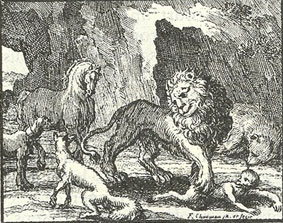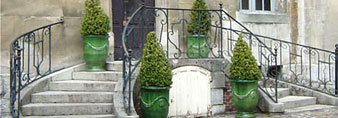THE MAID (VII, 5)
A certain maid, one of the haughty kind
Fancied she could a handsome husband find,
Young, beautiful, and formed to please the fair,
Nor cold, nor jealous—two things rather rare.
In him she also hoped to see
Wisdom, with birth and wealth agree.
But where might she such matchless lovers meet ?
Yet fate for her was careful to provide ;
And soon were seen adoring at her feet
Great offers—which the fair one scorned with pride.
“ What ! I look down on such ! Why, sure they dream
Propose themselves to me ! to my esteem !
Poor wretches! pitiful indeed, and blind.”
Some had no manners, others had no mind
One's nose was crooked, long, or flat ;
And some were this, and some were that,
Were everything she could not bear,
And so she spurned them with disdainful air.
After the great, a lower class aspired,
At which her juster indignation fired‑
“ I am too condescending sure,
To let such cattle near my door.
They think me eager for the marriage rite :
Thank God, in peace I pass the lonesome night.”
Vain with such thoughts, the fair conceited grew.
Age spoiled her charms—to lovers now adieu.
Two years or so passed heavily away.
Chagrin came next—while every day
The smiles, the sports, the loves in ruins laid.
She saw the havoc, and became afraid.—
Now paints were used to cover her decay ;
But all her skill to bloom and mimic prime,
Could not deceive that cunning thief Old Time.
The ruins of a house we can repair ;
Why do not faces this advantage share ?
Her note then lowered, while her mirror said,
Wed quick, my prude, wed, thou decaying maid.
Some thoughts I know not, also urged the fair—
Desire in prudes sometimes takes root ;
And ours, which all belief surpassed,
Found herself very glad at last
To wed a human brute. |
| |
THE WISHES (VII, 6)
There are in Great Mogul, we’re told,
Spirits, who servants’ places hold—
Keep house and furniture both clean and bright,
Sometimes the garden too they set to right ;
But if you touch their work, ’tis ruined quite.
One of them near the Ganges thus of old,
Dwelt with a man content with moderate fare,
And dressed his garden with unceasing care.
He worked in silence and with much address,
Loved much his master, nor his mistress less ;
His garden most.—Heaven knows if zephyrs mild,
Friends of the sprite, assisted as he toiled !
The demon, for his part, worked day and night,
And host and hostess gave delight.
Even farther still his . zeal to show,
Promised from them he’d never go ;
...However giddy in their place
...Were all his fellow-fickle race.
But his fraternity of sprites assailed
The chief of their republic, and prevailed,
By policy or caprice moved,
To make him change the lodgings so beloved.
The order came that let our demon know,
That to the north of Norway he must go,
To tend a house for ever hid in snow ;
And quit the Indian for the Lapland yoke.
Thus to his hosts, before he went, he spoke :
“ The faults I know not that against me lay,
But I with you no longer here may stay ;
A month, perhaps a week, some short delay.
Form then three wishes, and improve the time,
Ere I depart for my new destined clime :
Three, and no more.—To wish no pain requires,
Nothing to man so easy as desires.”
In the first wish abundance they demand—
Abundance gave them with a generous hand,
Filling their coffers with the shining ore,
Wheat in their granaries, in their cellars wine :
All bursting full.—But how arrange such store ?
What books, what time, what care for evermore
They both were puzzled to divine.
Thieves now came lurking round their door ;
Great lords their portions came to borrow :
Taxed by their prince, behold them worse than poor,
For too much fortune only wrought them sorrow.
“ Take from us this redundant wealth,” they cried ;
“ Happy the indigent, with peace allied !
Better is poverty than stores like these.
Off, riches, fly—and thou, 0 Queen of Peace,
Parent of happy minds who court thy reign,
O Mediocrity ! return again.”—
Straight Mediocrity again returned,
And blessed the couple who her absence mourned.
Two wishes thus gave and withdrew their store,
And now behold them happy as before—
Nor better than all idle wishers fare,
Who lose their time in castles in the air.
With them the demon laughed at this.
Now to obtain some solid bliss,
They seized the hour he was about to part
And asked for wisdom with an honest heart ;
The wealth that causes neither care, nor smart. |
|
THE LION'S COURT (VII, 7)
King Lion wished to know, as they record,
Over which nations heaven had made him lord—
Despatching to each wood and field
His royal letters signed and sealed,
He ordered all the neighbouring lands
To send him straight his vassal-bands,
Of every kind, from every side ;
For by the letters they were told
That he a plenary court should hold
During a month-to ope with pomp and pride,
..Upon a great rejoicing day,
Ending by tricks that Fagotin should play.
The monarch thus before his subjects' sight
At once displayed his majesty and might.
They to his Louvre now invited went ;
Louvre !—a very charnel-house, whose scent
Attacked his guests, and rendered them unwell.
The bear stopped up his nostrils at the smell-
Bad luck for him assuming such a face,
The monarch's wrath arose at his grimace :
He sent him down to Pluto grim,
To show his dainty snout to him.
The monkey this severity approved,
And praised the wrath by which the king was moved,
His royal claws, the den, the scent as well,
Amber and flowers were garlic to its smell.
But he a victim to his flattery fell.
That lordly Lion, with his ready paw,
Was cousins of Caligula they saw.
The fox drew near—“ Well, Sir,” the monarch cries,
“ What smell ye ?—tell me, speak without disguise.”
The fox thought fit then to apologise.
Urging a dreadful cold, he could but say _
He had no smell.—In fine, he got away.
This lesson, courtly reader, is for you.
If at the court you wish to please the ear,
Be no base flatterer, nor speak sincere,
But answer often as the Normans do. |

|
The Lion's court (François Chauveau)
|
THE VULTURES AND PIGEONS (VII, 8)
Of old, Mars made the air with tumult ring ;
A quarrel rose among the tribes above—.
Not those that cheer the smiling court of spring
With the sweet notes they all rejoicing sing,
And who, by their example in the grove,
Kindle in us again the flame of love ;
......... Nor those with gentle steps that draw
Venus in her triumphant car :
But vulture tribes with fearful beak and claw,
For a dead dog, they say, made war.
It rained with blood—I don't exaggerate ;
Were I minutely every point to state,
I should be out of breath.
Many a chief and hero slept in death.
Prometheus on his rock hoped soon to see
The battle terminate his misery.
'Twas mirth to watch their efforts how they sped ;
'Twas grief to count the numbers of the dead.
Skill, valour, cunning, and surprise conspired,
And either side with ardent wrath was fired.
No means they spared, the raging hosts,
To fill the air around with ghosts.
Through every element the carnage spread,
That filled the gloomy regions of the dead.
Their fury raised compassion in the doves,
So tender-hearted, faithful in their loves :
As neutral friends they interpose
...To bring the quarrel to a close.
Ambassadors the pigeon-nation chose,
Who soon tranquillity restore ;
The vultures gave the slaughter o'er.
A truce took place, and peace was made,
For which, alas ! the mediators paid—
To whom but gratitude was due.
Them straight the cursed tribes pursue,
Such slaughter made in every place,
They nearly rooted out the race.
Poor doves but little prudence had to boast,
Who reconciled the savage host.
Divide the bad, nor bid their quarrels cease ;
On that the earth depends for peace :
Sow war among them, bid them wade in gore.
... This by the way—I say no more. |
|



